Politics
Development Bank ‘not a guaranteed solution’

A NEW report by a think tank has assessed the potential of a public development bank for Wales to boost lending to firms and promote economic development locally.
The report by the Public Policy Institute for Wales describes evidence that ‘bank branch closures are having a negative impact on individuals and businesses in Wales, but more specific research is need to ascertain what impact bank branch closures is having on individuals and communities. Finding out the extent to which vulnerable areas are affected by bank branch closures can also help identify which specific services can be provided in the future.’
The report states: “However, even the most extensive public banking model, opening community banks would not be able to replace the branches that have been closed in Wales in recent years.”
On ways to protect banking services it comments: “A public development bank is potentially useful option, but not a guaranteed solution.”
Plaid Cymru Mid and West AM Simon Thomas said: “We need action from Governments in Westminster and Wales on bank branch closures.
“It is unacceptable that the bank network is being stripped from rural Wales. We cannot have a gap in the banking services available to rural and urban Wales.
“Plaid Cymru’s Westminster leader Liz Saville Roberts has called for a change in the law to protect the last bank in town. We are now seeing often in our communities from Llandysul to Llanidloes towns left without a bank.
“While bank branches are expensive to maintain and are used by fewer people in the past they are still an important resource. The report highlights research by the Federation of Small Businesses that bank branch closures affect small businesses in rural communities, as they are more likely to require cash purchases than in urban areas.
“High street banks have a duty to consult effectively with the local community over closures. While banks are private companies making commercial decisions, in effect access to banking is essential for modern life and participating in democracy.”
“The Labour Government in Cardiff Bay should be looking at how other financial institutions like Finance Wales and credit unions have a role to play. Other ways to protect banking services for small businesses and individual customers like developing the services provided by the Post Office will be hampered by the closure programme of successive Westminster governments of different political colours.”
The report identifies problems with lending to small and medium sized businesses, automation has made banks more geographically and operationally distant from small businesses.
Bank closures contribute to this problem according to the Federation of Small Businesses.
Mike Cherry, FSB National Chairman, said: “The rapid pace of bank branch closures across the UK presents some very real and tough challenges for small businesses. FSB members highly value the face-to-face interaction they receive in-branch, particularly when making complex financial transactions, with staff who often have a greater understanding of their business and the local economy. In addition, many of our members deal heavily in cash and cheques and need access to over-the-counter banking facilities on a regular basis.
“Small businesses are keen to embrace the opportunities of the digital economy. However, barriers towards digital inclusion, such as unreliable broadband connectivity, and a lack of confidence in using digital services creates serious challenges. These are some of the reasons which explain why the protection of in-branch banking is so important for financial inclusion.”
Large banks were three times more likely to shut a branch in Wales than in London and the south east of England, and five of the top ten areas affected by the 600 branch closures in Britain in 2015-2016 were in Wales – Powys, Denbighshire, Gwynedd, Conwy, and Carmarthenshire.
The FUW is particularly concerned as internet banking is not always an option in rural areas; many people will not have an appropriate internet connection- if they have a connection at all, and especially the elderly may not be familiar with IT and the process of doing their banking online.
Speaking earlier this summer, FUW President Glyn Roberts said: “The closure of rural banks has a detrimental effect on rural areas, as they serve not only villages and small towns but many of the neighbourhoods in surrounding areas, as well as providing employment to local people.
“Closures are a great loss to residents and local businesses, particularly the elderly or residents who are unable to travel to the nearest town. The closures will of course also affect small businesses, as they will have to travel further afield for their banking needs.
“In addition, internet banking is not always an option in rural areas; many people will not have an appropriate internet connection if they have a connection at all, and especially the elderly may not be familiar with IT and the process of doing their banking online.
“For many telephone banking is impractical, as they prefer to deal with their personal finances on a one-to-one basis and mobile banking is limited in many rural areas. It is worth considering as well that some people may not be able to get to mobile banks during the short time they are present in villages.
“With more and more rural services and businesses being closed down, we must also acknowledge that it is becoming less and less attractive for young families and indeed business owners to remain in the countryside.
“If the problem of rural depopulation is not addressed with some urgency it could have severe consequences for our rural communities and with that also our rural economy.
“It is clear that if we want to ensure that Wales develops its full potential in being a rural economic powerhouse, we must make it attractive for working families to stay and also encourage vital services like business banking to remain available in our countryside.
“The provision of acceptable broadband services is an increasingly critical part of meeting the needs of rural Wales.”
A report from the British Infrastructure Group found nearly a quarter of Welsh constituencies appear in the worst 20 constituencies in the whole of the UK for broadband speed.
Health
‘Children spending more time in digital worlds than the real one’

CHILDREN are spending more time in digital worlds than the real one, the Senedd has heard, with excessive screen use shaping behaviour and health in ways society cannot ignore.
Labour’s John Griffiths expressed concerns about the impact of smartphones and online gaming on young people amid an “epidemic of screen use” in Wales.
Mr Griffiths titled the debate “Locked in, Bruh!” – “the state of playing a video game while oblivious to anything else” – on the suggestion of Tom, a teenager from Newport.
He raised research from the Centre for Social Justice, a thinktank, which estimates that up to 814,000 UK children aged three to five are already engaging with social media.
The Newport East Senedd Member told the chamber two-thirds of primary school pupils in Wales have their own smartphone by the age of 11.
Mr Griffiths said boys spend two hours more a day on online gaming while girls spend more time on social media and “reel scrolling” which has been linked to damaging self-esteem.
He told Senedd Members: “Boys are becoming more short-tempered and violent when exposed to violent video games and there is, rightly, much concern that children in more deprived families are particularly vulnerable.”
Mr Griffiths, who was first elected in 1999 and will stand down in 2026, said children aged five to 16 spend at least six hours a day looking at a screen. He added that for children, aged 11 to 14, that figure rises to nine hours a day.
He pointed to research showing more than 70% of young people in the UK do not undertake an hour of physical activity a day yet have at least six hours to spend looking at a screen.
He said: “Children are sat inside with a screen at the end of their nose and are not spending time outside enjoying their local communities or playing and interacting with friends.”
Mr Griffiths warned of increasing levels of obesity and rising numbers of young people reporting vision problems, with one in three children globally now short-sighted.
He told the Senedd: “As for the mental health and wider social impacts, anxiety and depression are increasingly linked to excessive screen use as is sleep disruption – with social media interfering with rest and emotional development.”
He raised a New Zealand study of more than 6,000 children that found a correlation between excessive screen time and below-average performance in literacy and numeracy. He warned children have increasingly shortened attention spans and an inability to concentrate.
Mr Griffiths shared the case of his constituent, Danielle, who said her son becomes more aggressive and snappier after a significant time gaming. Lucy, another constituent, explained how her children find the endless reels on social media addictive.
“Once they start scrolling, it’s hard to break that cycle,” the Senedd Member said. “And when she and her husband take the devices away, it often results in tantrums and tears.”
Mr Griffiths raised the example of countries such as Australia, France and Italy which have introduced strict age checks and bans on social media for under 16s.
He acknowledged such a policy would need to come from the UK Government because powers over internet services are not devolved. But he said Wales has the authority to introduce measures through education policy on, for example, smartphones in schools.
The Tories’ Sam Rowlands warned algorithms are having a “sickening” effect on teenagers who are eight times more likely to act on self-harm urges when exposed to such content. “TikTok users with eating disorders receive over 4,000% more toxic content,” he warned.
Responding to Wednesday’s (December 17) debate, Jane Hutt recognised how so-called doom scrolling can have a detrimental impact on young people.
Wales’ social justice secretary said: “We are living through profound change. Childhood today is shaped by technology in ways that were unimaginable a generation ago… For many young people, screens, smartphones and online gaming are part of everyday life.”

Community
Senedd unanimously backs sign language bill

PLANS to make Wales the best place in the UK for British Sign Language (BSL) users moved a significant step closer to becoming law with the Senedd’s unanimous support.
If ultimately passed, the BSL bill – introduced by the Conservatives’ Mark Isherwood – would end Wales’ status as the only UK nation without specific sign language protections.
Leading a debate on Wednesday December 17, Mr Isherwood said the Senedd supporting the bill’s general principles was a “huge step ahead” for the “vital” legislation.
Mr Isherwood, a disability rights campaigner for decades, explained his backbench bill would introduce legal requirements to promote and facilitate the use of BSL in Wales.
He said the bill, if passed, would be the most progressive piece of BSL legislation anywhere in the UK, recognising BSL is a language in its own right, not a communication support need.
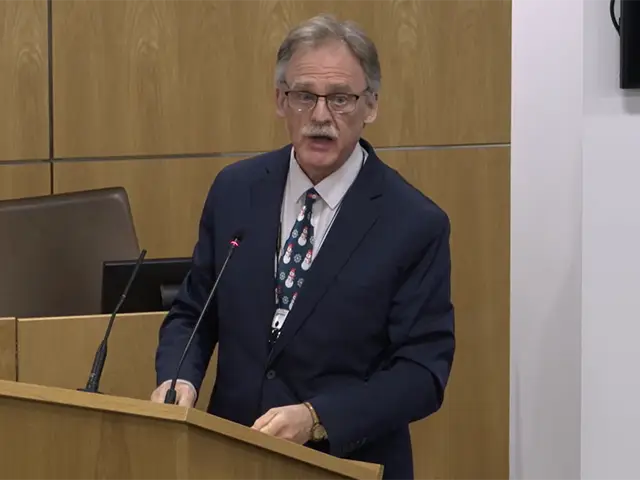
He highlighted that the bill would establish a BSL adviser role, the first statutory post of its kind in the UK, describing its importance as something that “cannot be overstated”.
Mr Isherwood, who chairs cross-party groups on disability and deaf issues, told the Senedd: “This isn’t just my bill. This is the bill of the BSL community. Let’s make this happen together and be proud of it together on behalf of deaf people across Wales.”
Jenny Rathbone, the Labour chair of the Senedd’s equality committee, was convinced of the “overdue” need for legislation to give more standing to British Sign Language.
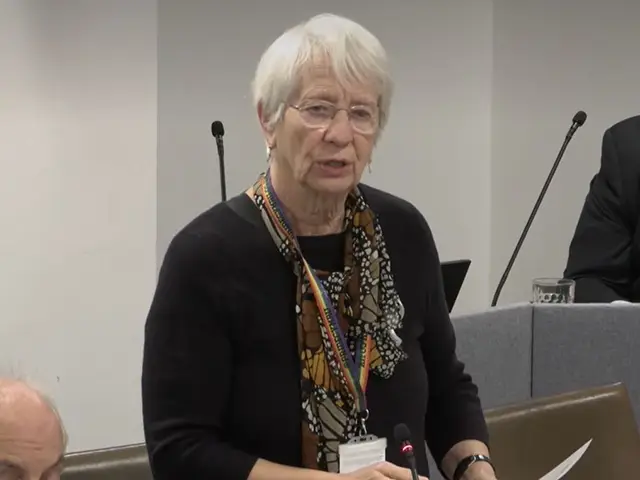
Ms Rathbone said the committee heard the biggest barrier “by some margin” was the availability of interpreters and the sustainability of the workforce.
She quoted a signer who told the committee: “The bill would make us feel respected and valued. But without proper funding, planning and deaf-led leadership, it won’t go far enough.”
Sioned Williams, Plaid Cymru’s shadow social justice secretary, told Senedd members: “Language is a part of our identity, our culture and our personal dignity.
“When someone cannot use their language, they are excluded from education, health care, employment and public life – and that is not acceptable in today’s Wales.”
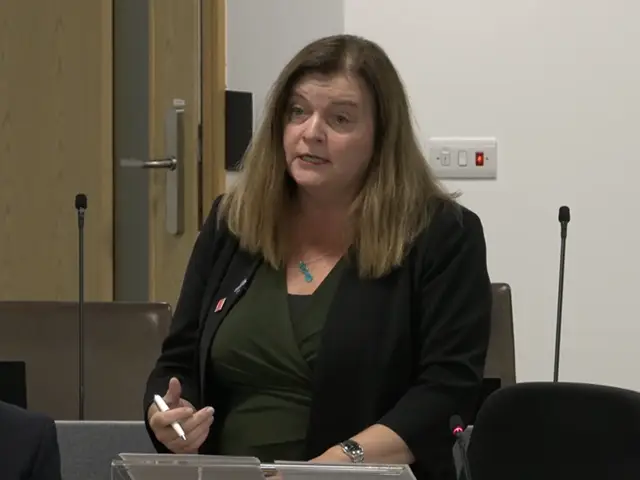
Ms Williams warned that if the legislation fails to deliver real change, the deaf community would be left “angry, disappointed and very, very disheartened”.
She expressed concern that the bill does not legally require the BSL adviser to be a deaf person, arguing it is “not appropriate, possible or efficient” for non-signers to lead the way.
Mr Isherwood defended the decision not to require that the adviser must be deaf, warning a successful legal challenge to a single such provision could cause the entire bill to fail.
Welsh Liberal Democrat leader Jane Dodds warned of an immediate workforce crisis, with only 54 registered sign language interpreters in Wales as of July.
With many now approaching the end of their working lives, she said: “We cannot – we must not – allow this bill to fail because we didn’t have the foresight to address this crisis now.”
Support for the bill stretched across the political spectrum, with Reform UK’s Laura Anne Jones similarly welcoming the “long-overdue” and “vital” legislation.
Jane Hutt, Wales’ social justice secretary, confirmed the Welsh Government’s financial backing, committing £214,300 for the bill’s first year of implementation in 2026/27.
If it clears the final hurdles, Mr Isherwood’s proposal will be the first backbench bill to enter the statute book in about a decade following the Nurse Staffing Levels (Wales) Act 2016.
Community
‘Nowhere I can play’: Disabled children excluded from Welsh parks
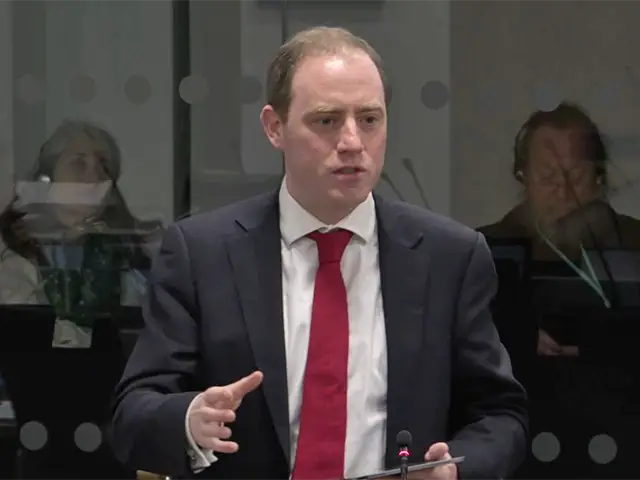
NEARLY four in ten disabled children in Wales “never or hardly ever” play outside due to a “heartbreaking” lack of accessible parks, politicians have warned.
Rhys ab Owen, an independent, described the situation as “disgraceful” as he cited a Play Wales report showing 37% of disabled children are effectively shut out of playgrounds.
Leading a debate in the Senedd on Wednesday December 17, he read the testimony of a ten-year-old boy from Blaenau Gwent who said: “Nowhere disabled friendly – parks haven’t got disabled friendly equipment, so I can’t play.”
Mr ab Owen warned: “There shouldn’t be any discrimination… disabled children do face much greater problems in terms of park maintenance, and with accessibility and inclusion.”
He shared the experience of a 13-year-old girl from Newport who told researchers: “There’s nowhere I can play or hang out safely by myself as I use a frame to help me walk.”
The former barrister warned budget cuts were leading to a managed decline in standards, quoting a 13-year-old from Caerphilly who said: “Due to anti-social behaviour our equipment gets broken, burnt and vandalised and is then not replaced.”
The Conservatives’ Natasha Asghar was stunned by the scale of the crisis and revealed that only 11% of playgrounds in Wales are rated “green”, meaning they are fully accessible. By contrast, almost half are rated “red” for poor accessibility.
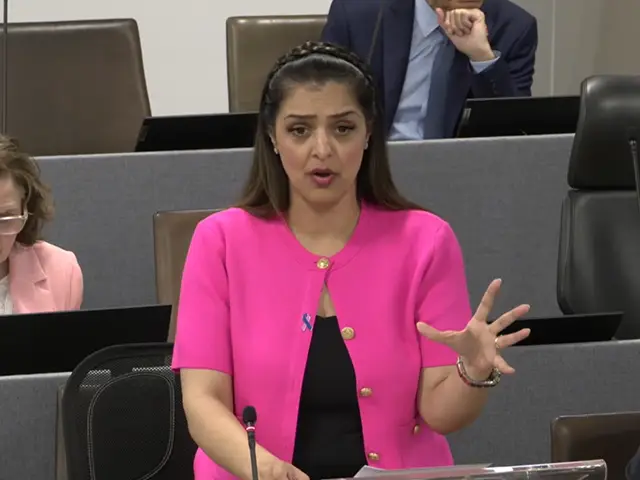
Listing the barriers families face, Ms Asghar highlighted that 30% of sites lack accessible paths and nearly one in five have gates too narrow for wheelchairs. “Those are just two of the barriers preventing disabled children from accessing play,” she said.
Jane Dodds, the leader of the Liberal Democrats in Wales, argued the shocking statistics should be a wake-up call for Senedd politicians.
“To hear that 37% of disabled children in Wales say they never or hardly ever play outside should be a figure to stop us all in our tracks,” she said.
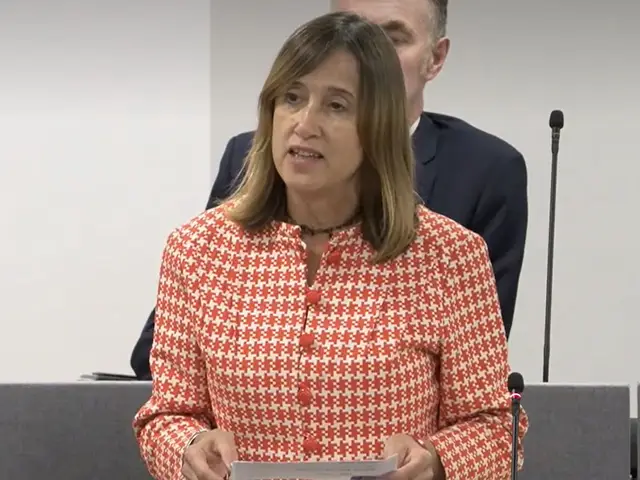
Meanwhile, Mike Hedges pointed out that Wales became the first country in the world to put a duty on councils to secure “sufficient play opportunities” for children in 2010.
And Julie Morgan, a fellow Labour backbencher, celebrated Cardiff becoming the UK’s first Unicef-accredited child-friendly city in 2023.
Dawn Bowden, the minister for children, pointed to £5m to improve playgrounds this year but she too was “disappointed” by play satisfaction figures falling from 84% to 71% since 2019.

She said the Welsh Government has provided a “toolkit” to Wales’ 22 councils, “ensuring a holistic outcome-focused approach” to inclusive and accessible play.
The cross-party motion, which called for play to be protected from cuts – as well as improved access for disabled children – was agreed unanimously but does not bind ministers.
-

 Crime22 hours ago
Crime22 hours agoMilford Haven man jailed after drunken attack on partner and police officers
-

 News4 days ago
News4 days agoDyfed-Powys Police launch major investigation after triple fatal crash
-

 Crime3 days ago
Crime3 days agoMan sent to Crown Court over historic indecent assault allegations
-

 Crime2 days ago
Crime2 days agoMan charged with months of coercive control and assaults
-

 Crime20 hours ago
Crime20 hours agoTeenager charged following rape allegation at Saundersfoot nightclub
-

 Crime5 days ago
Crime5 days agoMan spared jail after baseball bat incident in Milford Haven
-

 Crime3 days ago
Crime3 days agoMilford Haven man admits multiple offences after A477 incident
-

 Crime2 days ago
Crime2 days agoWoman ‘terrified in own home’ after ex breaches court order






















